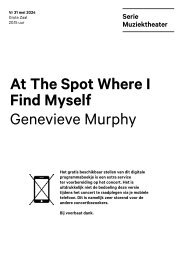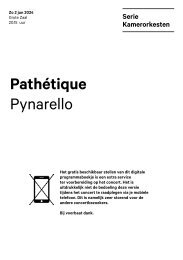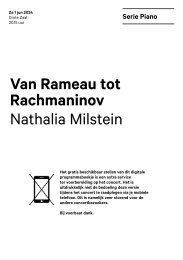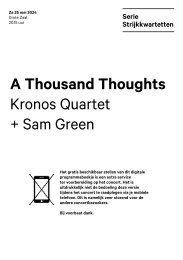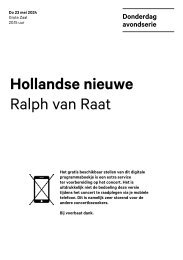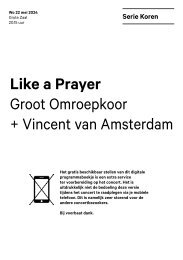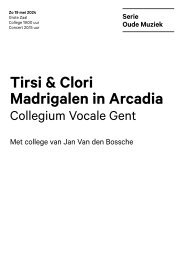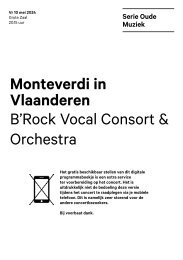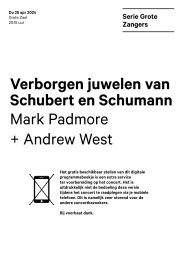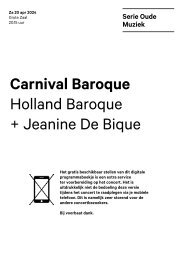Create successful ePaper yourself
Turn your PDF publications into a flip-book with our unique Google optimized e-Paper software.
Programme notes<br />
‘I was on the verge of something that didn’t have a true name... A luring slumber...<br />
A slipping away from myself...”. These lines by Anna Akhmatova, used by John Tavener in<br />
the last of his Akhmatova Songs, are so haunting.<br />
They are neither disclosing nor vague; their<br />
precision lies between words, and it is the<br />
intonation, the gentle curve, and the special<br />
glow of the phrase that makes them so<br />
memorable. Or else, it is that glance into<br />
the beyond cast by a person who is not<br />
intimidated by dying that one can see in<br />
photographs of Akhmatova – not penetrating<br />
or transfixing, but bypassing, seeing<br />
through and farther. One of the greatest<br />
Russian poets whose fate was truly tragic, a<br />
contemporary and admirer of Shostakovich,<br />
she was preoccupied with the mysteries of<br />
life and death throughout her artistic career.<br />
It wasn’t an exotic interest for her. Having<br />
lost innumerable friends and loved ones<br />
to the terrors of the revolution and Stalin’s<br />
regime, she nicknamed herself ‘a wailer’.<br />
Her relationship with agony, despair, and<br />
death was intimate and personal. Gradually,<br />
through her devotion to her work and much<br />
suffering, she developed her monumentally<br />
simple, regally unassuming poetic style.<br />
Many of her mature pieces appear so blunt<br />
and transparent that they almost seem banal;<br />
but they have a strange mesmerizing power<br />
– as if the true meaning transpires somehow<br />
through the words, coming from behind or<br />
beyond them.<br />
Covert emotional charge<br />
Perhaps Akhmatova would appreciate this<br />
concert’s program. She might enjoy its dark<br />
and cold tones, its restraint, and its covert<br />
emotional charge. The pieces in this concert<br />
are like silent guards of a mystery. At times<br />
otherworldly, at times supernatural, they are<br />
connected by the direction of their gaze—<br />
through and beyond, concentrating on things<br />
that are unseen, unspeakable, and eternal.<br />
Different intensities or efforts appear to be<br />
attached to that kind of looking. Sometimes,<br />
as in the legendary Bach’s Chaconne, it is<br />
supported by a great sense of fairness and<br />
sublime order; it is a patient, fearless, and<br />
accepting way of looking into the unknown.<br />
In his Akhmatova cycle, John Tavener<br />
adopts a very different way of looking, as<br />
if through half-closed eyes, slumbering.<br />
Nothing is clear, angular, or apparent here;<br />
the outlines are soft and misty. It could be<br />
a dreamy, enveloping world, but it is the<br />
spareness of lines, the transparency of this<br />
refined ensemble of soprano and cello that<br />
communicates a clever urgency to this<br />
marvellous, unusual work.<br />
In a sequence of somewhat austere and<br />
introverted works in this concert, Janáček’s<br />
Violin Sonata provides a shocking contrast.<br />
There is some holy foolishness about<br />
Janáček’s visionary musical language. The<br />
work, which according to the composer<br />
was an intuitive response to the outbreak<br />
of World War I, is full of wild and desperate,<br />
overwhelming energy: it is literally propelled<br />
into soaring heights in its reckless, manic<br />
search for meaning.<br />
10






